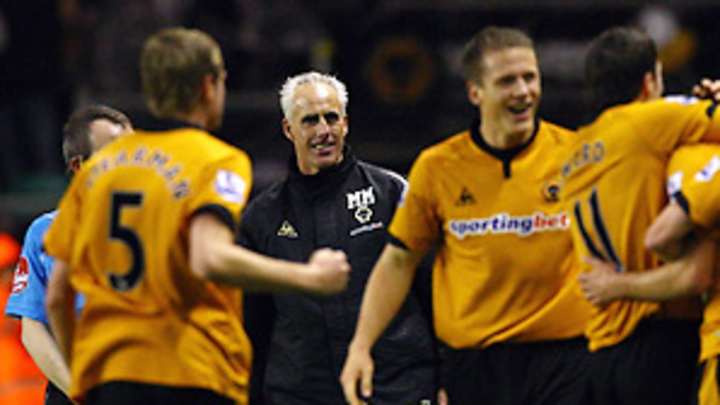Is turnover fair play? It should be

You've heard the cliché: It's a marathon, not a sprint. And, sometimes, when you're running long distances, it's OK to take a pit stop.
So if the season is 38 games long and you know there are some games where you have about as much a chance of winning as Tiger Woods has of regaining his formerly spotless public image, why not simply live to fight another day?
That's what Wolverhampton Wanderers did Tuesday, when it traveled to face Manchester United at Old Trafford. Now, United is the defending Premier League champion. Wolves is a newly promoted team, and a pretty bad one at that. Avoiding relegation this season for Wolves and their manager, Mick McCarthy, would be as comparable an achievement as Sir Alex Ferguson winning the Premiership again.
Next weekend, Wolves face Burnley, another newly promoted team and a likely direct competitor to avoid the drop. Which is why McCarthy felt it would be a good idea for Wolves to pace themselves: Rest some regulars against United (since he wasn't likely to get anything out of the game anyway) and then come out at full-strength, all guns blazing against Burnley in a match that really matters. (At least, it does to Wolves).
But McCarthy did much more than that. He dropped 10 players from the team that had beaten Tottenham the previous weekend. That's right, 10 out, 10 in, with goalkeeper Marcus Hahnemann the only holdover. In came guys like left back Matt Hill, making only his second appearance of the season. GeorgeSurman in midfield, making his second start of the year. Stefan Maierhofer, making his first start of the season. And, of course, somebody named GeorgeFriend who, until that point, had not played at all.
It looked as if Wolves were tanking the game. And in fact, Man. United won 3-0, though the Wolves "B" team actually did an OK job. The English media called it "shameful" and, as far as the Wolves fans who traveled to Old Trafford hoping to see their best players were concerned, it was pretty low.
"This was the best team I could pick among the players who did not play on Saturday," McCarthy said, possibly stating the obvious. "My decision will be judged on whether or not we stay in the Premier League. I'm not bothered by what anybody thinks."
Now before we look at the ethics of all this, it should be said that there is a rule in the Premier League books that says you have to field your strongest possible team. Except it's a silly rule, because it's totally unenforceable and flouted by many. We see teams resting players ahead of big games all the time. And, besides, who is to say what a team's "Best XI" is?
But leaving that aside, the fact is that McCarthy had every right to do what he did. He's the manager and it's his rear end on the line if Wolves underachieve. Like he says, he's judged on the season, not on an individual game. However much his actions leave a bad taste in one's mouth (and they most certainly do), he's entitled to do what he thinks is best for Wolves in the long run.
Having said that, you would hate for this to become a trend. What if the next time a struggling club travels to Old Trafford or the Bernabéu or San Siro and it decides simply not to play? Or play the reserves? How soon before the fans feel cheated?
What makes McCarthy's action stands out is the brutal honesty of what he did. He could have sprinkled in a half-dozen regulars and told him to play at half-speed, so as to avoid injury and not exert themselves too much. Would that have been better?
There is a tremendous amount of hypocrisy in the game, and this is just one example. McCarthy did what many managers probably would do, except they don't have the guts to do it. If it works out and Wolves win against Burnley, we'll never know if it was because of the day off the starters received at Old Trafford. But if he had played his best XI and lost a couple regulars through injury or suspension and then succumbed to defeat this weekend and it led to Wolves' relegation, then what?
It's an academic argument and, precisely for that reason, we have to give McCarthy enough latitude to do what he thinks is best. No matter how depressing it might be. Maybe, if there is a deeper lesson to be learned, it's about how certain top-flight leagues have become so lopsided that some clubs feel they don't have a prayer even before they step on the pitch. But that's not McCarthy's fault.
